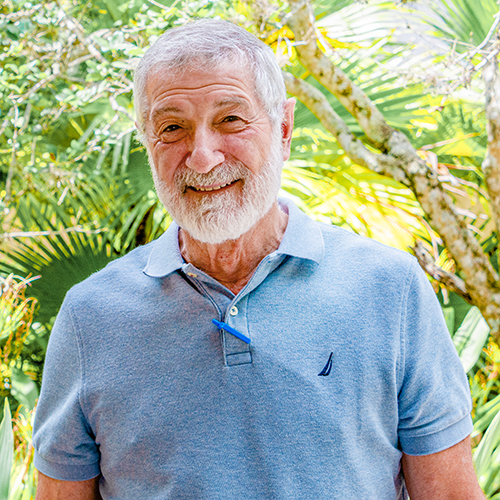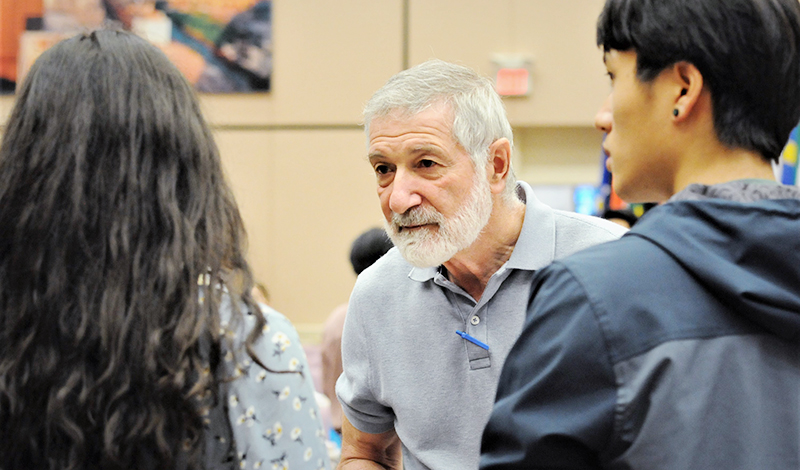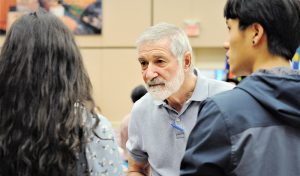The World Tribune sat down with Dr. Ira Helfand at the Florida Nature Culture Center in Weston, Florida, where he lectured in late July on nuclear abolition at the SGI-USA Student Division Conference.

Dr. Helfand is a member of the International Steering Group of the International Campaign to Abolish Nuclear Weapons (ICAN) and is a co-founder and past president of Physicians for Social Responsibility, the U.S. affiliate of the International Physicians for the Prevention of Nuclear War.
World Tribune: Thank you for taking the time to speak with us about a topic crucial to the future of humanity. What has been your impression of the students you’ve met here at the Florida Nature and Culture Center?
Ira Helfand: I’ve just been super impressed by: 1) how positive they are, 2) how interested they are in this issue and 3) how eager they are to engage in conversation and—I believe—future action toward the elimination of nuclear weapons.
It has been my experience that, in general, young people don’t know a lot about the threat of nuclear weapons, but when they hear about it, they react the same way they do to the climate crisis: This is our planet, this is our future, we need to do something to protect it. I find that response sort of amplified here among this particular group of students who seem really, really keyed in on assuming responsibility for the world.
WT: In speaking with people across the country and the world, what do you feel is missing from the average person’s understanding of nuclear weapons?
Helfand: I think two things. First is an appreciation of how dangerous the situation is. During the Cuban missile crisis in 1962, we all walked around sort of looking over our shoulder all the time, worried that at any moment things could go wrong. The situation today is probably almost as dangerous as it was during the Cuban missile crisis, maybe as dangerous, and there’s certainly not that level of anxiety or even attention to the issue that there was back then. There’s more concern about nuclear war than there was, say, two years ago, but nowhere near the level of concern that the current danger warrants.
Then the other thing is: I don’t think people understand how bad nuclear war would be. It’s been a long time since that conversation has been part of public discourse. And people are always shocked when I explain as I did in the talk this morning what’s actually going to happen if these weapons are used. … And when people learn about this they are often quite shocked and surprised. So those two things: an awareness of how imminent the danger is and an awareness of how catastrophic a nuclear war would be. And then when they do hear about this, the third piece is an understanding that this is not the future that needs to be—that there is something we can do about it, that we can prevent this from happening.
WT: The German philosopher Arthur Schopenhauer said that truth always passes through three stages: 1) ridiculed, 2) viciously attacked and 3) accepted. What stage do you think the nuclear abolition movement is in at this moment, and what do you anticipate as this movement gains momentum?
Helfand: Is there an allowable stage before that, of indifference? I think that’s where we are. People are ignoring the situation. I don’t think people are ridiculing it, and I don’ t think they will. I do think we have been and will be attacked by those who want to deny this truth. This is a very inconvenient truth.
When people understand how dangerous nukes are, they want to get rid of them. And the entire security policy of most of the major countries in the world today is based on the continued existence of nukes, which means they need to completely rethink the way they do things, which is a very good thing for them to do, but they don’t see it that way.
WT: In galvanizing people to take action, what is the proper balance to strike between an affirmative vision for the future and the terrible, very possible future of a world engaged in nuclear war?
Helfand: What’s the role of fear, right? Well, I think you need to have both. Given all the problems people face every day, things like climate change, racial injustice, economic problems and problems in their own lives, they’re not going to attend to the nuclear issue unless they understand that they really need to be afraid.
On the other hand, they also need to know there’s something they can do about it. So I think both are absolutely essential. I think the message has to be threefold: 1) nuclear war really is going to happen if we don’t do something different; 2) it’s going to be much worse than you can possibly imagine; and 3) it does not have to happen; we can do something about this.
The more concrete we can be about that, the more we can provide a specific plan of action. The Back from the Brink campaign is so important. It provides a very concrete vehicle that people can use to achieve the elimination of this danger of nuclear war.
WT: Having lived through, as the students at this conference have not, the Cold War and the Cuban missile crisis, what are some lessons you think young people can draw from the successes and failures of the movement?
Helfand: I think the main lesson we can draw from that past is that it is possible to be successful in this endeavor. We did not anticipate in the 1980s that we were going to be successful, and we did it anyway because we were desperate. We thought the world was going to end if we didn’t end the Cold War arms race, and I think we were right. It would have. But we were successful beyond our wildest expectations. And when people look at the situation today, they are sometimes despairing of the possibility of changing nuclear policy. I think they need to remember how successful we were back in the 1980s and take great hope from that. We have seen that it’s possible to bring about fundamental change in nuclear policy; we’ve already done it once.
We’re not setting ourselves an impossible task; we’re just challenging ourselves to do what we’ve already done successfully once before. And I think that really is the most important lesson from history.
You are reading {{ meterCount }} of {{ meterMax }} free premium articles





